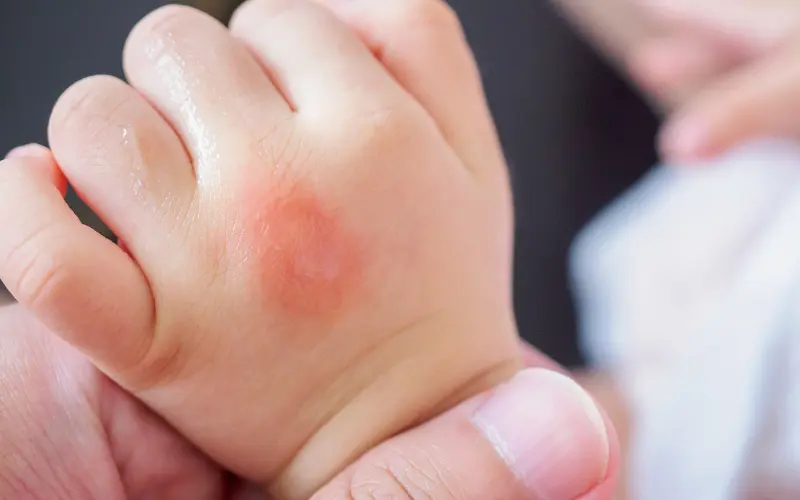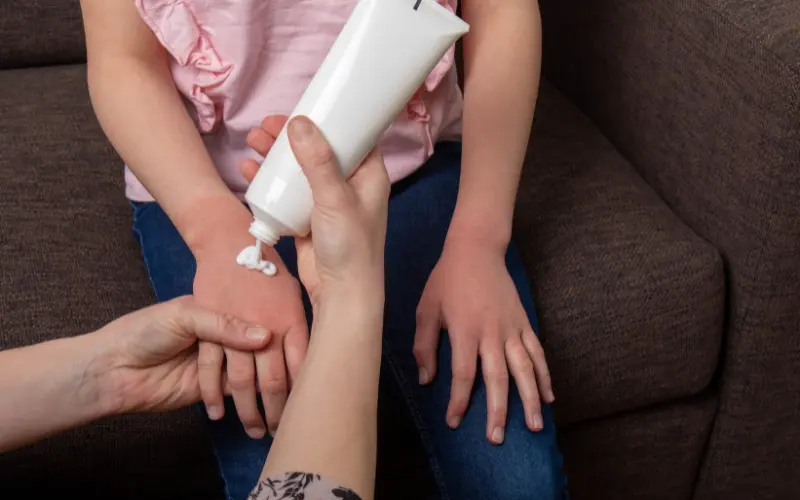Table of Contents
Natural Remedies For Baby Eczema
Baby eczema is a common skin condition that can cause discomfort and irritation for your little one. While it can be distressing to see your baby’s delicate skin affected, there are natural remedies that can help soothe the symptoms and promote healing. In this guide, we will explore how to deal with baby eczema naturally, offering valuable insights and solutions to keep your baby’s skin soft and healthy. Along the way, we’ll introduce some of our store’s top products that can help in treating baby eczema effectively.
Eczema can be distressing for both parents and babies, but there are numerous natural remedies that can help soothe irritated skin and reduce flare-ups. According to experts, understanding the root causes of baby eczema is essential to finding the right treatment. Many healthcare professionals recommend natural remedies for baby eczema that have been shown to alleviate symptoms effectively. This trusted resource offers comprehensive information about various treatment options, making it a valuable guide for parents looking to improve their baby’s skin condition.
What is Baby Eczema and What Causes It?

Eczema, also known as atopic dermatitis, is a skin condition that causes red, inflamed, and itchy patches on the skin. In babies, it often appears on the cheeks, arms, and legs but can show up anywhere on the body. The exact cause of eczema is unknown, but it’s generally linked to genetics, immune system function, and environmental triggers.
Factors like harsh soaps, dry air, and certain fabrics can exacerbate baby eczema, making it crucial to avoid potential irritants. Thankfully, there are several ways to treat and manage baby eczema naturally, minimizing flare-ups and helping your baby feel more comfortable.
How to Deal with Baby Eczema Naturally

When it comes to how to deal with baby eczema naturally, the key is to focus on gentle, nourishing care. Avoiding harsh chemicals and opting for natural remedies can significantly improve your baby’s skin condition. Here are some effective ways to manage baby eczema:
- Moisturize frequently: Dry skin is one of the main contributors to eczema flare-ups. Using a gentle, eczema-friendly moisturizer like our Natural Baby Eczema Cream can help lock in moisture and protect your baby’s skin barrier.
- Avoid irritants: Steer clear of harsh soaps, synthetic fabrics, and heavily fragranced products. Opt for hypoallergenic, fragrance-free options, such as our Organic Baby Soap, which is gentle on sensitive skin.
- Use lukewarm water for baths: Hot water can dry out the skin and worsen eczema. Always use lukewarm water and limit bath time to 10 minutes to prevent skin from drying out.
By following these simple steps, you can create a soothing environment that reduces eczema symptoms. Consistent care with natural products will help keep flare-ups under control.
Dealing with sleep deprivation after your baby arrives can feel overwhelming, especially when you’re already navigating the challenges of baby eczema. It’s important to find ways to manage your exhaustion while also caring for your little one. Creating a restful sleep environment for both you and your baby can make a significant difference. For tips on How to Deal With Sleep Deprivation After Baby consider strategies like setting a consistent bedtime routine or incorporating relaxing activities to improve your sleep quality. Prioritizing your health and well-being will not only benefit you but also allow you to better care for your baby’s needs.
How to Treat Baby Eczema Naturally

There are various ways to treat baby eczema naturally, and many parents find that home remedies can offer relief without resorting to strong medications. Here are a few tried-and-true natural remedies:
- Oatmeal baths: Colloidal oatmeal is known for its soothing properties. Adding finely ground oats to your baby’s bath can reduce itching and inflammation.
- Coconut oil: Can you use coconut oil to treat baby eczema? Yes! Coconut oil is an excellent natural moisturizer with antimicrobial properties. Applying a small amount of Organic Coconut Oil from our store can help soothe and hydrate irritated skin.
- Aloe vera: Aloe vera gel is another natural remedy that can reduce inflammation and promote healing. It’s gentle enough to use on your baby’s sensitive skin and can be applied directly to eczema patches.
These remedies are great for providing immediate relief and preventing future flare-ups. However, it’s important to be consistent with your baby’s skincare routine to see long-term benefits.
Can You Use Coconut Oil to Treat Baby Eczema?

One of the most frequently asked questions by parents dealing with eczema is, “Can you use coconut oil to treat baby eczema?” The answer is yes! Coconut oil is a natural moisturizer that has been shown to reduce inflammation and improve skin hydration. It’s particularly effective for eczema because of its soothing and healing properties. When using coconut oil, make sure to choose a high-quality, organic option like our Pure Organic Coconut Oil, which is perfect for sensitive baby skin.
Applying coconut oil after your baby’s bath can help lock in moisture and create a protective barrier over the skin. It’s also rich in lauric acid, which has antimicrobial properties, making it an ideal solution for preventing infections in irritated areas.
Managing Diaper Blowouts and Leaks
Dealing with diaper blowouts and leaks can be frustrating, especially when your little one has sensitive skin prone to eczema flare-ups. Choosing the right diaper is key to preventing these mishaps and keeping your baby comfortable. Look for high-quality, leak-proof diapers that offer better protection and are gentle on delicate skin. To avoid irritation, consider using hypoallergenic baby wipes and protective diaper creams that help create a barrier between your baby’s skin and moisture. Regularly changing diapers also helps in minimizing contact with wetness, which can trigger eczema. Explore our recommended products [here] for some of the best solutions to manage diaper blowouts while keeping your baby’s skin safe.
How to Deal with Baby Eczema Naturally: Additional Tips
While skincare plays a major role in managing baby eczema, there are other lifestyle changes you can make to reduce flare-ups. Here are a few more tips on how to deal with baby eczema naturally:
- Dress your baby in breathable fabrics: Cotton is a great fabric for babies with eczema because it allows the skin to breathe and reduces irritation. Avoid wool or synthetic fabrics that can cause friction.
- Maintain a humid environment: Dry air can worsen eczema symptoms, especially in the winter. Using a humidifier in your baby’s room can help keep the air moist, reducing skin dryness.
- Monitor your baby’s diet: If you’re breastfeeding, some foods in your diet may trigger eczema flare-ups in your baby. Dairy, nuts, and soy are common culprits, so consider eliminating them from your diet if you notice a connection.
By taking a holistic approach that includes both skincare and environmental changes, you can help soothe your baby’s eczema and prevent future flare-ups.
How to Treat Baby Eczema: The Importance of Moisture

Keeping your baby’s skin well-hydrated is one of the most effective ways to treat baby eczema. Moisturizers should be applied immediately after a bath when the skin is still damp to lock in moisture. For particularly dry areas, you can apply a thick layer of our Natural Baby Eczema Cream before bed, allowing it to work overnight.
In addition to using creams and oils, make sure your baby is getting enough fluids throughout the day to stay hydrated from the inside out. This is especially important if your baby is starting solids, as hydration plays a crucial role in maintaining healthy skin.
Can You Use Coconut Oil to Treat Baby Eczema? Yes, Here’s How

To further address the question, “Can you use coconut oil to treat baby eczema?” here’s a step-by-step guide on how to incorporate it into your baby’s skincare routine:
- After bathing your baby, pat their skin dry with a soft towel, leaving it slightly damp.
- Take a small amount of organic coconut oil and warm it in your hands.
- Gently massage the oil onto your baby’s eczema patches, focusing on dry or irritated areas.
- Allow the oil to absorb into the skin before dressing your baby in soft, breathable clothes.
Using coconut oil regularly can help soothe inflamed skin, reduce redness, and improve overall skin health. It’s an affordable, natural solution that many parents swear by.
Understanding and treating skin conditions in newborns is essential for their comfort and well-being. Just like eczema, which causes discomfort due to dry and irritated skin, jaundice is another common condition affecting babies. Jaundice occurs when a newborn’s liver isn’t fully developed, leading to a yellowish tint in their skin and eyes. If you’re interested in learning more about jaundice, including its symptoms, causes, and treatments, be sure to check out our detailed guide on Jaundice in Newborns – Symptoms, Causes, and Treatment Being aware of various skin and health conditions will help you better navigate early parenting challenges.
Frequently Asked Questions: How to Treat Baby Eczema
- What triggers baby eczema? Common triggers include dry skin, allergens, certain fabrics, and harsh chemicals in soaps or detergents.
- How often should I moisturize my baby’s skin? Ideally, you should moisturize at least twice a day—once after a bath and again during diaper changes or as needed.
- Can baby eczema go away on its own? While eczema is a chronic condition, many babies outgrow it as they get older. However, managing it with natural remedies can help reduce the severity of flare-ups.
Conclusion: How to Deal with Baby Eczema Naturally
In conclusion, how to deal with baby eczema naturally involves a combination of gentle skincare, natural remedies, and environmental adjustments. By following these tips and using high-quality products like our Natural Baby Eczema Cream, Organic Baby Soap, and Pure Organic Coconut Oil, you can keep your baby’s skin soft, hydrated, and irritation-free.
Natural remedies such as coconut oil, oatmeal baths, and aloe vera can be incredibly effective in treating baby eczema, offering soothing relief without harsh chemicals. Incorporating these solutions into your baby’s daily routine will help manage eczema symptoms and provide comfort for your little one
When dealing with baby eczema, ensuring comfort on the go is crucial. Whether you’re heading out for a quick errand or a family vacation, managing your baby’s sensitive skin can be a challenge. Traveling with a baby requires careful preparation, especially when selecting the right gear to keep them cozy and their skin irritation-free. From hypoallergenic baby carriers to gentle, breathable swaddles, knowing what to pack can make all the difference. For a complete guide on How to travel with a baby, and the gear you need check out this article.

